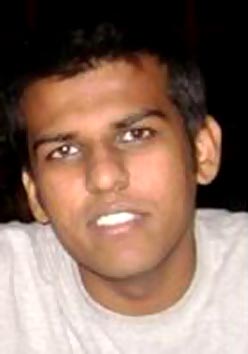Divya Nair
26 year old Aroop Chaudhari is almost a professional CAT cracker now. The biomedical engineer from Thadomal Shahani Engineering College, Mumbai has appeared for the Common Admission Test five times since 2006.
He has consistently scored above 98 percent in all his attempts, the recent being 99.36 percent in CAT 2010.
Although Aroop is not appearing for CAT this year, he says the exam demands you to be 'smart' and not 'intelligent'. So, if you pick the right questions, you may stand a chance to make it to a good business school in the country.
Aroop is currently working as an investment banker with Motilal Oswal Securities Limited and plans to pursue his post graduation in Finance from the United States of America.
We talk to him to find out more about his preparation, how he improved his strategies over the years and why he chose America for his higher education.
How much did you score in your first CAT exam? What is your most recent score?
I scored an aggregate of 98.64 percent in CAT 2006. That was my first attempt. Since then I have been regularly appearing for the exam. I scored 99.36 percent in the 2010 exam.
What made you take the CAT five times?
I gave the exam for the excitement of it. I wanted to improve my scores and see if I can do better than my last attempt. I learnt from my mistakes and I must say, I am happy with my progress.
What were your initial preparation strategies? How have you improved over the years?
Initially, I would refer books by Arun Sharma and study material from TIME.
Since I was also preparing for Graduate Record Examinations (GRE), my skills in English language, especially for Reading Comprehension and Verbal Ability had greatly improved.
I have also appeared for the Graduate Management Admission Test. Over the years, I started giving the exam to improve my performance and better my scores. I have learnt from my mistakes. The more you practice, the better strategies you will master.
How much did you score in GMAT? Are you planning to give the CAT this year?
I scored 730 in GMAT. I do not plan to take the CAT this year.
What were the mistakes you originally made? How did you tackle them?
I made mistakes with simple calculations. I see this problem is very common. Many of my friends also faced the same problem initially.
The solution is to identify where you go wrong and work towards minimising errors in basic calculations.
If you observe, most problems that appear in CAT involve basic formulae and calculations. If your basics are strong, you will find it easy to solve them. Also, you need to work on your improving your concentration.
Also read: 50 MOST important formulae for CAT 2011
Also read: The 10-point mental strategy for CAT 2011
Also read: Last minute tips from CAT 2010 toppers
Also read: 'If you think you are IIM material, nothing can stop you'
Click NEXT to continue
'The key is to be fast yet accurate'
Data Interpretation
No matter how much you prepare for DI, the questions in this section will continue to surprise you in the final exam. So, the key is to approach the questions with an open mind.
Stay calm while you are attempting this section. Read the questions careful and interpret them well before you start solving them.
If you ask me, I would suggest that students should first attempt this section. The reason being that this section requires a great amount of concentration and if you tend to start with other sections first, you may not be able to devote your attention towards this section in the end.
Quantitative Analysis
People who love Mathematics will find this section interesting. I would advice this section be considered second in priority.
Time is a crucial factor for this section. So, remember to keep a track of time while solving Quant problems. Do not spend too much time on a single problem. Optimise your time and try to solve the easier ones first. The key is to be fast yet accurate.
Reading Comprehension
I prefer solving this section last. That is because, English is not my strength. Most engineers would do the same, I believe. The reason being, as engineers, we are skilled in Mathematics and we would definitely want to use it to the best of our advantage. It also depends on how you want your sectional cut offs to reflect on your future course of study.
If the institute you plan to apply to emphasises on English skills, you will have to work on improving your scores in this section. And similarly for other sections, depending on your choice of institute and the requirements they seek.
'The trick is to pick the right questions and answer them well'
I am currently working as an investment banker with Motilal Oswal. I plan to pursue my Masters from the United States of America.
Why did you choose US for your higher education? Why not India?
I think US (of America) offers good education for Finance graduates. Although the market trends suggest otherwise, I think the job market is quite stable there.
Besides, in India, most PG level programmes are of one year duration and hence one doesn't have too much scope to study, research or work as an intern.
I intend to choose a two year comprehensive MBA programme which will help me master new concepts and also help me gain an internship opportunity, where I can put my skills to use.
What factors will you keep in mind while choosing a b-school in India or abroad?
First of all, you need to be certain about your plans of higher education, particularly about the stream of specialisation you intend to pursue for your MBA in. Once that is decided, you must find out which institutes are offering the above programmes for you.
Make a list of top 10 or 20 institutes (in India and abroad) and shortlist the ones you think you stand a good chance of making it through.
If you are making this decision at the preparatory stage, you may also want to check the institute's past records of cut offs and then, set a target for yourself to improve your scores accordingly.
I think 98 percent and above would be a good target for those who would like to apply at one of the b-schools in India.
Besides choosing a school that offers good academic education, you must find out what was the highest package offered by the school. This is where most people end up making the wrong choice and end up being disappointed.
For example, if I am earning about 12 lakhs a year. I invest about 5-10 lakhs a year for my higher education and the placement I receive at the end of my education is roughly about 19 to 20 lakhs per annum, I don't think it's worth the deal. Look at the cost you incurred in your education and ask yourself if you will be satisfied with the package you will receive at the end of it.
Let me put it this way. You are earning 12 lakhs already. In two years time, if you stay in the same company or move to a different organisation, you will definitely get a raise of about 25-30 percent which is similar to the package you will receive after holding a Master's degree. So, you have to weigh these factors also while making the choice.
What can one do to optimise their scores?
I would say, to crack the CAT, you need to be smart, not intelligent.
Everyone knows that you will not have answers to all the questions. So, the trick is to pick the right questions and answer them well. You will definitely score enough to get into a good b-school.




Comment
article